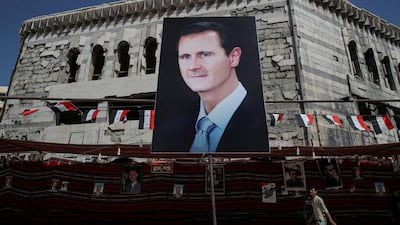In Syria, 2018 was the year the final embers of revolution against Bashar Al Assad were extinguished.
With the backing of Moscow and Tehran, the regime clawed back more territory from a faltering and disorganised rebellion, secured Damascus, and won a crucial diplomatic victory in the form of normalisation by Arab governments.
It was handed another pivotal win by Donald Trump, who last month cast aside by tweet his own administration’s carefully laid plans to build up the US presence in eastern Syria as a counterweight to Iran and to bolster western leverage in peace talks. The US would retreat from the region, leaving Russia, Turkey and Iran to sort out the shape of a final settlement, Mr Trump said.
But let’s back up for a minute and look at some of the key events that shaped the conflict, now nearing its eighth year.
In April, Mr Al Assad's forces wrested control of the Damascus suburbs of eastern Ghouta after a punishing siege, more than 2,000 casualties, and a campaign targeting rescue workers and medical facilities. The regime capped the months-long bombardment with a chemical attack that killed dozens of civilians in Douma, provoking western airstrikes that meted out little real punishment.
Thousands were exiled to Idlib, in the north, which remained the sole province under rebel control by year’s end. Thousands of others chose to stay and reconcile with the government.
That victory secured Damascus from rebel attacks, a feat solidified by another swift campaign from mid-June to late July that reclaimed Daraa, the birthplace of the uprising in March 2011. The southern province fell with ease in the face of the Russian-backed assault, dealing another crippling and symbolic blow to anti-regime forces.
Mr Al Assad's control over the Jordanian border led to the reopening of the Nassib crossing in mid-October and the resumption of trade with Amman, a step that heralded further normalisation with Arab powers keen to have a say in Syria's future and to limit Mr Al Assad's dependency on Iran. Both Bahrain and the UAE later reopened their embassies in Damascus and the Arab League is now likely to readmit Syria.
Despite threatening to attack Idlib, a campaign that would have led to the largest humanitarian catastrophe in a war that has killed half a million people, Russia and Turkey came to an understanding that suspended the offensive. In January, Ankara signalled once again that its key priority is limiting Kurdish influence at its border, by invading and ousting Kurdish militias from the border region of Afrin, a campaign undertaken with Russia’s permission.
All the while, peace talks under the auspices of the UN have remained irrelevant, upended by those that have taken place between the three powers with an extensive presence on the ground: Russia, Turkey and Iran. Plans to convene a constitutional committee to draft Syria’s post-war charter faltered, but the project itself is likely to survive as part of a watered-down transition plan to satisfy European powers and pave the way for reconstruction aid, and a stake in Syria’s future for the West.
Trump’s shock announcement that he would soon withdraw from Syria removed what little western leverage existed there and destroyed months of build-up for what was believed to be a long-term US presence.
It has instead unleashed a race among regional powers to position themselves within the confines of a post-American Middle East. Moscow, which has long spearheaded the effort to maintain Mr Al Assad and the Syrian regime’s international respectability, has found common cause with Arab countries seeking to limit the influence of Iran, which has increasingly been seen as having a competing vision for post-war Syria with Moscow. Efforts to wean Mr Al Assad’s Syria from Iran have failed in the past, but they appear to be the motivation for this new drive towards regional recognition.
The revolution, meanwhile, has lost its voice. Beset by competing agendas and an international community that has done little to stem the violence beyond theatrical pronouncements at the UN Security Council, it fell to a brutal military campaign from without, and disunity, corruption and the strength of jihadist militias from within. Militants assassinated the well-known activist Raed Fares and his friend Hammud Al Junayd in November. Most jihadist groups that still have military capabilities are beholden to Turkey, puppets whose master now barely attempts to hide the strings.
As 2019 begins, Mr Al Assad has won, his military victories burnished by growing international acceptance that he will remain in power, and nurtured by Russia’s success in normalising his tyranny. The voices that once called for freedom and dignity in Syria, for an end to repression at the hands of the regime’s security services, for an accounting of the fates of political detainees, have quietened and will grow quieter still.
The flames of war will die down, offering many some respite from their suffering and the hope of normal life resuming. But the dream that propelled so many Syrians out on those peaceful demonstrations eight years ago is further away than ever.


